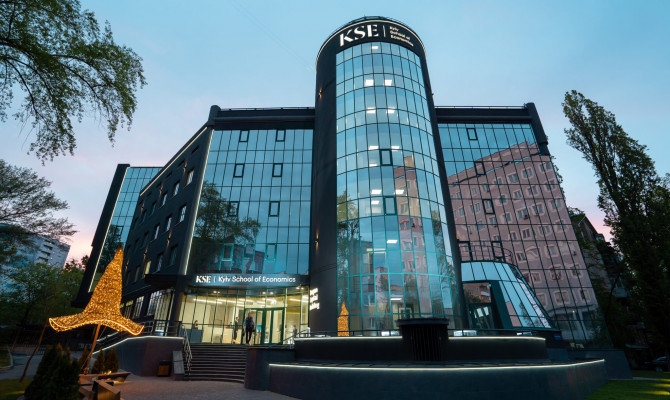Milovanov and “Cosmolot”: How the Kyiv School of Economics Conceals Its Finances and Breaks the Law

A scandal erupted around the Kyiv School of Economics (KSE) after it was revealed that the so-called “university campus” in Kyiv’s Obolon district is being developed through a structure co-owned by a charitable foundation linked to Russian national Sergey Tokarev — a sanctioned figure involved in illegal gambling operations and closely tied to the controversial “Cosmolot” brand.
According to public records, Tokarev is subject to Ukrainian national security sanctions, and his charitable fund has emerged as a co-investor in the real estate project promoted under the KSE educational brand. This fact prompted us to scrutinize the school’s financial transparency: what is KSE’s real structure, where does its funding come from, and is it in compliance with Ukrainian law?
Financial Reporting Under Lock and Key
We searched public databases for KSE’s financial disclosures over recent years — but found no reports on funding sources, spending details, or allocations to specific projects.
Under Article 17 of the Law of Ukraine “On Charitable Activities and Charitable Organizations”, charitable foundations (which includes KSE, legal code EDRPOU 35133288) are required to publish comprehensive annual financial statements and disclose all inflows and use of targeted donations. KSE has consistently failed to meet this obligation.
We submitted formal requests to OSUN, CIVICA, REStud, USAID, Sida, the World Bank, and the EBRD — all publicly listed international partners of KSE. We also contacted the school directly, addressing its president Tymofiy Mylovanov. Our letters asked for clarification regarding the involvement of a fund linked to a sanctioned Russian national and the gambling platform “Cosmolot” in the Obolon campus project. We also requested comment on the apparent suppression of journalistic investigations and the school’s lack of public financial reporting.
Not a single partner responded or offered any comment. It appears the “Cosmolot” connection has become a taboo subject among KSE’s donors and affiliates.
The Report Exists — But Explains Nothing
While no financial statements were publicly available, the Kyiv Tax Authority responded to our formal request and shared copies of KSE’s financial reports for 2021 to 2024. These documents revealed that over four years, the foundation reported revenues exceeding 2.7 billion UAH — approximately $21.5 million in 2021, around $26.5 million in 2022, close to $18.6 million in 2023, and about $15.4 million in 2024.
Despite these large sums, KSE declared zero profit each year. The reports contain no information about funding sources, project breakdowns, or named donors. Instead, KSE filed its financials using forms designed for micro-enterprises — Forms No. 1-m and No. 2-m — which are only meant to cover basic accounting data, without detailing expenditures or donor structures.
Even more concerning is the dramatic surge in accounts receivable, which inexplicably soared to 1.28 billion UAH (approximately $33 million) in 2024. Such an anomaly could indicate hidden transfers between affiliated entities, funds allocated to fictitious projects, or efforts to obscure the ultimate beneficiaries of grant money. Instead of providing clarity, these reports raise major red flags.
Why Micro-Level Reporting is a Problem for KSE
KSE submitted its financial data using reporting templates intended for micro-enterprises with limited operational scale and no donor accountability. These templates — approved by Ukraine’s Ministry of Finance under Order No. 25 (January 24, 2011) — are not suitable for a billion-hryvnia nonprofit.
By using them, KSE avoids disclosing how donor funds are spent, what projects receive financing, or even where the money originates. In the context of an organization managing tens of millions of dollars — much of it from international development agencies — this lack of detail is more than a formality. It undermines the very principles of transparency and good governance.
This approach also violates Article 12 of Ukraine’s Law on Accounting and Financial Reporting, which mandates that organizations must provide full, accurate, and timely information about their financial condition. KSE’s statements contain no explanatory notes, fail to disclose income sources or spending details, and provide no rationale for the sharp rise in outstanding receivables. This is not just a compliance issue — it’s a structural breach of transparency norms expected from any serious recipient of international funding.
What Happens Next
Based on these findings, we intend to file formal complaints with the National Agency on Corruption Prevention (NAZK) and Ukraine’s Ministry of Justice. These will address KSE’s failure to fulfill its obligations as a charitable organization, its lack of open reporting, and the possible misuse of donor funds under the guise of philanthropy.
If our concerns are not addressed, we are prepared to pursue legal action — not only against KSE as a legal entity, but also against public oversight bodies that have neglected their responsibility to enforce compliance.
Lastly, we will inform international donors and leading media outlets. Because this is not just a Ukrainian problem — it reflects directly on the global reputations of the institutions that continue to partner with and fund KSE. Silence in the face of such concerns does not preserve credibility. It erodes it — globally.




 of the agreement of syndication with Financial Times Limited are strictly prohibited. Use of materials which refers to France-Presse, Reuters, Interfax-Ukraine, Ukrainian News, UNIAN agencies is strictly prohibited. Materials marked
of the agreement of syndication with Financial Times Limited are strictly prohibited. Use of materials which refers to France-Presse, Reuters, Interfax-Ukraine, Ukrainian News, UNIAN agencies is strictly prohibited. Materials marked  are published as advertisements.
are published as advertisements.